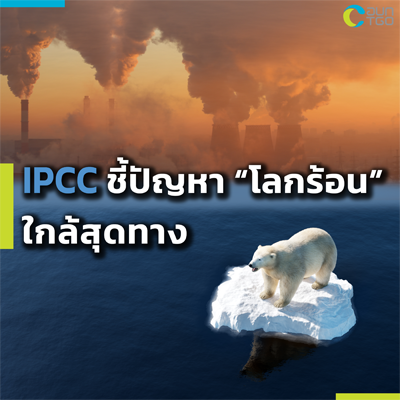Article
The Intergovernmental Panel on Climate Change

The Intergovernmental Panel on Climate Change (IPCC) has published a report "Concrete Science Fundamentals Climate Change 2021" in Part 3, where the first two parts of the report have been released. In August 2021, Part I of the report describes the "danger signs" that the planet will be warming beyond control. and will point out that A warming world could result in the irreversible collapse of human civilization. The February 2022 "Part 2" report and "Part 3" report outline concrete ways to make the world This card can still live in the future and emphasizes that it must "Start doing it now" to avoid catastrophic consequences. Because from the present, the surface temperature of the earth has risen 1.1 degrees higher than the pre-industrial era.
The IPCC's "Part III" report assesses the current state of the world as a warning sign if the world is unable to curb more greenhouse gas emissions than countries have announced by 2030 (NDC goals). that means The temperature control goal is no more than 1.5 degrees of the Paris Agreement. It won't be possible and tells you how to accomplish this as well, the IPCC said if it wanted to keep global temperatures from more than 2 degrees above the mid-19th century. The world must not use oil 30 percent reserves, gas 50 percent reserves and coal 80 percent reserves, even if CO2 capture technology is in place. It said ending government subsidies to fossil fuels around the world could cut emissions by as much as 10 percent by 2030, adding another approach would be to "switch to clean energy". The world must switch to clean energy with "zero" greenhouse gas emissions or "Net Zero Emission" by 2050 will have to turn to electric power and other non-polluting energy In addition, energy needs should be reduced from the consumer side as well, such as eating mainly plant foods. use of electric cars Transportation without a car long distance communication building weather resistant buildings reduce long-haul flights including increasing energy efficiency This will reduce carbon emissions by 40-70% by 2050. A viable way is to remove carbon dioxide from the atmosphere. Whether it's planting a forest or using chemical tools to extract carbon dioxide from the air. It is of great importance in advancing the goals of "Net Zero Emission" and "Global Temperature Reduction".
reference: https://www.matichon.co.th/article/news_3289925



